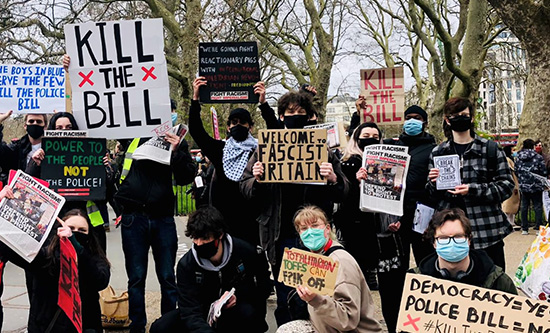
On 1 November, the Public Order Bill 2022 passed from the House of Commons to the House of Lords for its consideration. The Bill’s purpose is to further criminalise direct action protesters. It is essentially a rehash of those sections of the Police, Crime, Sentencing and Courts (PCSC) Act, which the government failed to get through both houses of parliament earlier this year. NICKI JAMESON reports.
The PCSC Act was passed by Parliament in April 2022, with most parts of it becoming law in June. It contains a wide range of punitive measures, targeting prisoners, the Gypsy, Roma and Traveller community and other groups. The best publicised and most controversial sections, however, have been those which attack protesters. The Act extends the range of conditions previously applied to marches to static demonstrations. It also lowers the Public Order Act threshold for labelling actions as causing ‘serious disruption to the life of the community’ to include those delaying ‘access to any essential goods or services, such as money, food, water, energy, or fuel’, and allows the police to prevent protests if they consider the noise is causing ‘harassment, intimidation, alarm or distress to people in the area’. These measures are designed to limit effective protest.
Not content with this assault on the right to demonstrate, the government attempted to add further clauses to the PCSC Act, specifically aimed at direct action groups like Just Stop Oil (JSO), Extinction Rebellion and Stop HS2. Although the power of the unelected, but frequently more liberal, House of Lords to alter government-backed legislation is limited, the late stage at which these additional clauses were introduced meant that the Lords were able to strike them out of that Bill. As we wrote in FRFI at the time: ‘This is a welcome victory, although there is nothing to prevent the government reintroducing these measures in a separate piece of legislation in future.’
This was indeed the case, with the final Queen’s Speech in May 2022 including an announcement that: ‘Legislation will be introduced to ensure the police have the powers to make the streets safer [Public Order Bill]’. The following day, then Home Secretary Priti Patel put the Bill before the House of Commons for its first reading.
Mirroring the clauses from the PCSC Bill, the Public Order Bill now introduces new criminal offences of: ‘locking on’ and ‘being equipped for locking on’; ‘causing serious disruption by tunnelling’ or by ‘being present in a tunnel’, and ‘being equipped for tunnelling; obstructing ‘major transport works’ and interfering with ‘key national infrastructure’.
The Bill also gives the police further powers to stop and search – with or without suspicion. Most worryingly of all, it makes provision for Serious Disruption Prevention Orders (SDPOs), which can be imposed for a period of up to two years, either following a protest-related conviction, or alternatively following an application to the magistrates’ court by a chief constable without any type of criminal penalty needing to have been imposed on the person.
SDPOs are highly draconian and can be comprised of a wide range of conditions: not to go to places or associate with people, not to use the internet for certain purposes, not to possess specified items and not to participate in specified activities. A person subject to one can be electronically tagged for monitoring purposes for up to 12 months. Breaching the SDPO is in itself a criminal offence, punishable by a fine or a prison sentence of up to 51 weeks.
On 18 October (the day before her brief departure from the post, only to return the following week) Home Secretary Suella Braverman added yet another clause, this time allowing her or her successor to apply to the courts for injunctions against any individual who they ‘reasonably believe’ is going to be carrying out ‘activities related to a protest’ that ‘are likely to cause serious disruption’.
The Public Order Bill has been widely condemned by lawyers, human rights groups and even some Tory MPs, although not by Labour leader Keir Starmer, who told LBC radio on 24 October that he favoured harsh sentences for protesters who block roads. Unlike the attacks on the right to peaceful public protest contained in the PCSC Bill, however, it has not sparked the type of nationwide ‘Kill the Bill’ demonstrations which took place at the various stages of the parliamentary process. This is not altogether surprising. It is often said that the best way to defend a democratic right is to exercise it, so just as the best way to show that we will not be beaten off the streets by the PCSC Act is to keep on taking to the streets, those protesters at whom the Public Order Bill is aiming have continued to lock on, tunnel and otherwise disrupt the infrastructure. In the past six months there have been some 2,000 arrests of supporters of JSO, with October 2022 seeing actions every day and the start of November four days of disruption to the M25 orbital motorway. As of 16 November there are currently 35 people in prison, either awaiting trial or serving a sentence.
Like every one of the repressive measures being brought in by the Conservative government, the Public Order Bill does not stand alone. Together with the PCSC Act, the Nationality and Borders Act, the forthcoming National Security Act, and a raft of other draconian legislation, it makes up an increasingly vicious policing machinery, designed to control and oppress not just one group of direct action climate protesters, but anyone who steps out of line. As the cost of living crisis becomes unbearable for large sections of the population, the numbers of people in confrontation with the state cannot fail to increase. We need to stand together against all these attacks. An injury to one is an injury to all.
FIGHT RACISM! FIGHT IMPERIALISM! 291 December 2022/January 2023




